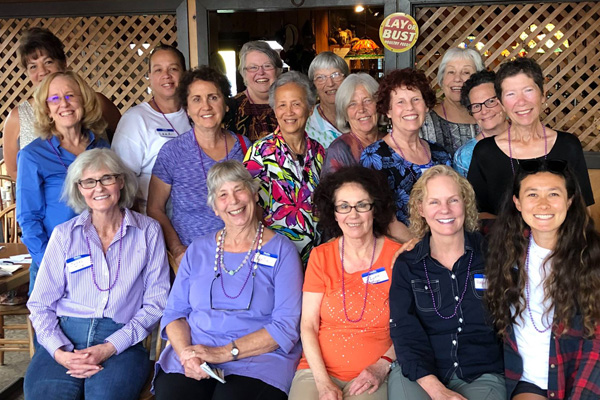The Watercolor Philanthropist
 Clytie Mead, seated second from the left in the front row, at a quarterly meeting of the 100 Women Who Care in North Hawaiʻi in 2019.
Clytie Mead, seated second from the left in the front row, at a quarterly meeting of the 100 Women Who Care in North Hawaiʻi in 2019.
Photo courtesy of 100 Women Who Care in North Hawaiʻi
An artist and philanthropist, it’s fitting that Clytie Mead left her mark on Hawai‘i and the world through her creativity and her generous spirit. Born in 1942, Clytie pursued her passion for art with a bachelors of fine art in painting at Carnegie Mellon University and, later, with a masters of art in architectural history at Cornell.
Creativity in Art and Philanthropy
In the mid-1980s, she married Pete Sparks and the pair moved from Southern California to Hawai‘i Island, where he pursued his interests in restoring old machinery and their mutual love of dogs, owning as many as five at a time. They settled in the rural community of Āhualoa, where Mead lovingly created an authentic Japanese tea room in their home and furthered her artistic and philanthropic visions.
Inspired artistically by the abundant beauty of Hawai‘i Island, Mead worked in a variety of media, favoring watercolor. She became best known for combining a western artistic vocabulary with the ancient Chinese painting technique of watercolor on silk, often using her painting to bring attention to rare and endangered treasures of Hawai‘i. Her 2017 exhibit at Volcano Art Center featured five paintings of ʻōhiʻa lehua blossoms and sought to raise awareness about the devastating fungal disease Rapid ʻŌhiʻa Death (Ceratocystis Fimbriata) threatening the iconic native species. Her work has been exhibited in Hong Kong and Japan and is in many private collections in Hawai‘i and the U.S.
But it was Mead’s philanthropy that truly expressed the breadth of her compassion, as well as a creative approach to community involvement. In 2015 she gathered five women she knew and founded 100 Women Who Care in North Hawaiʻi, a giving circle inspired by the national 100 Women Who Care program, where a collective of women meet quarterly, each contributing to support local projects nominated by members. Beneficiaries included Waimea Emergency Food Pantry and Hamakua Youth Center.
“Clytie was a great person, a selfless person,” says Page Macy, who knew Clytie through 100 Women Who Care in North Hawaiʻi, which she joined at its second meeting. “You could tell that she gave with her heart and soul. She was very caring and believed if you want to do some good, you should start in your own backyard. She was gracious, generous, kind, patient, talented, and fun-loving.”
Increasing the Probability of Success
Clytie carried on a family tradition of supporting the success of young people, particularly those seeking training to gain employment. She shared that her grandfather, Arthur Jackman, who came to America to work in the steel mills, was scheduled to immigrate aboard the Titanic, but missed its departure and had to travel on a later ship. Though he was working class, through his skill and knowledge Jackman invented a crucible for melting steel that was indispensable in the dramatic expansion of domestic steel production due to increased demand during WWI. He co-founded Vesuvius Crucible Company, which became a source of success and wealth for him and his descendants.
Inspired by her grandfather’s ability to achieve success despite a lack of higher education, Mead sought to support opportunities for students to be successful without necessarily having to get a four-year college degree. She brought the Arthur Jackman Scholarship Fund with her to the Hawai‘i Community Foundation (HCF), reforging her grandfather’s support for practical education by providing financial support to students residing in Hawai‘i and enrolled in a technical or vocational college or program at a community college. Mead was also deeply engaged with HCF in identifying local causes to support that would further her vision, including STEM and Career Connected Learning programs.
On her passing in April 2021, Mead left behind her greatest philanthropic legacy, a substantial gift to the Pahiki Nui Fund she established at HCF. Named by renowned Hawaiian scholar Kū Kahakalau to mean “big probability,” the fund’s purpose is to support programs and projects that increase the probability for educational success for pre-school through high school students on Hawai‘i Island, with a preference for public schools serving low-income or at-risk students.
“Clytie had the biggest smile, warm heart, and generous spirit,” said Diane Chadwick, HCF’s former director of donor relations on Hawai‘i Island before she retired in 2024. “She enjoyed meeting the students that received the Arthur Jackman Scholarship and took great interest in programs that gave them a better chance at success, like one of the earliest Early College programs at Waiākea High School. She wanted young people to have opportunities to succeed in life, as exemplified by her grandfather.”
Clytie will be remembered for her artistic brilliance and altruistic dedication to people in her community, many of whom will enjoy educational and career success for generations to come thanks to her family’s legacy. She remains an inspiration for others to appreciate and preserve the beauty and culture of Hawai‘i Island, to improve the probability of success through education for its people, and to innovate new pathways and programs for philanthropic giving.
Read more Stories of Impact